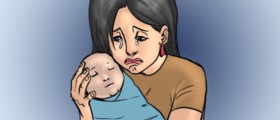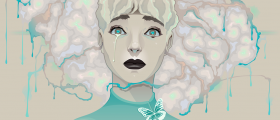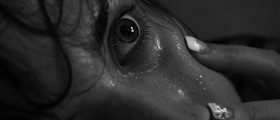
It is not strange for the women to experience a period of depression after the childbirth and this condition is known as postnatal depression (PND). Women’s spirits tend to be low at this time and they can go from ‘baby blues’, which is considered to be a mild and normal period of mood disorder, to postnatal psychosis, rare, but grave condition, with PND being somewhere in between. It is estimated that 10 to 15% of new mothers will experience PND, and it usually affects women in the first month after the childbirth.
A woman going through PND is likely to experience the symptoms of ‘ordinary’ depression, since she will feel low and miserable and break down in tears especially in the morning. New mothers can find themselves not enjoying having a new baby, and the lack of sleep due to the new daily routine can cause them to become irritable with the child and the partner, while loss of appetite is also possible. Anxiety is frequently associated with PND. Concern for the newborn, which is normal in all mothers, is sometimes too much to deal with for women with PND, so it may lead to panic attacks where a woman feels as though she is about to collapse, or where she is experiencing a stroke or a heart attack.
Some women feel they are in a predicament and that death might be the only way out, which is why some of them have suicidal thoughts. These thoughts should not be taken for granted with the family and friends, who should make special efforts to talk to the woman in this state and try to convince her that there are other ways of coping with the difficulties. Seeing a doctor seems like a reasonable thing to do in this situation. While the exact cause of PND is difficult to determine, it is very likely that hormonal changes after childbirth, lack of sleep and stress arising from having to look after the newborn are contributing factors. Still, some mothers are more prone to develop the illness than others, which is particularly true of women who had previous episodes of depression, or those who had to deal with a lot of stress during their pregnancy.
It is important to note that there is a treatment for PND which is more or less the same as it is for ordinary depression. It usually helps to talk about the problem and get extra help with the baby care. Some cases require the use of antidepressants. It is important to recover as soon as possible. It is necessary to rely on the partner and take some personal time; normal diet and sleep are essential, and talking to the GP or other new mothers is highly recommended. Although their mood might be disturbed, mothers with PND are no threat to the baby. This is more typical of women with postnatal psychosis, but like PND, this is also a treatable illness.

















Your thoughts on this
Loading...